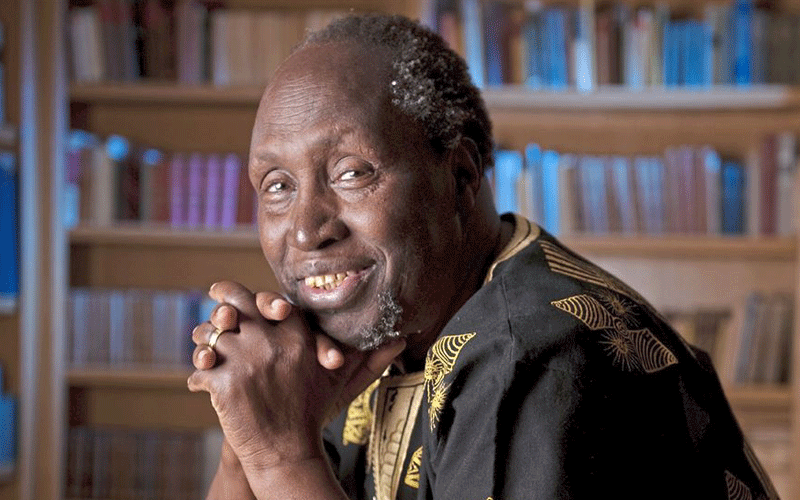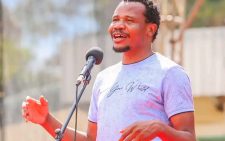Where will another voice like Ngugi wa Thiongo’s come from?

“(Ngugi) never just wrote books,” celebrated journalist Charles Onyango-Obbo wrote in his X tribute to Prof Ngugi wa Thiong’o. “He staged revolts, each title a well-aimed Molotov hurled at the colonial cannon, the neo-colonial bureaucrat, and the post-independence sell-out”.
These are loaded statements that capture every ideal that Ngugi stood for in his life and which he championed in his work.
They also say something which is rarely acknowledged about the author; that even when he took to a podium to speak, his voice, plaintive as it was, was also powerful.
It reverberated in the corridors of power because Ngugi had cultivated that uncommon ability to fluently speak truth to power without raising his voice, which was like soft thunder.
It was sweet to the ears of those who hearkened to his gospel, but chastising to those who abused their positions of authority to deny justice and dignity to the downtrodden majority.
In Petals of Blood, for instance, Ngugi, using his authorial voice to speak through his characters, had this to say: “The truth is that our people are starved, not only of food but of knowledge, dignity, and honour. The only cure for hunger is food. The only cure for oppression is to fight back.”
The questions he raised then remain germane today: How come many Kenyans still sleep hungry more than 60 years after independence? Why are so many children not able to go to school, yet the government is run by black people who have always promised liberation whenever they campaign for political office?
Can we still blame colonialism for our problems, yet we have what it takes to determine our collective destiny?
Ngugi knew well that the political class, which inherited all the trappings of power from the colonial State, would be uncomfortable answering these questions.
Rather than hear the voice of reason within, all they heard was the thundering roar that came from the barrel of his pen. Sadly, instead of listening to the message, they turned their wrath on the messenger.
Still, he did not shy away from his high calling, even when this came at a steep personal cost, including detention without trial under the Jomo Kenyatta administration and exile during President Daniel Arap Moi’s era.
Now, his body is gone. Without a doubt, however, his spirit of courage and vision for humanity remains as alive as when he walked in the streets of Nairobi, studying it, examining its nuances, scrutinising its soft underbelly.
The question that Kenya as a nation must ask is: From where will a voice as authoritative and as forceful as his come?
This is a critical assignment given the sad state that Kenya’s education system is in. Because of systematic institutional failures, schools for the poor and marginalised remain underfunded, yet these have the potential to address the economic inequality that Ngugi spent his life-fighting.
He understood the hunger for knowledge that has remained perennially palpable among young Kenyans who have been held back by successive unresponsive political establishments.
As South Africa’s Economic Freedom Party, which Julius Malema leads, said in its tribute to the writer, “his words challenged systems, inspired generations, and gave voice to the spirit and struggles of our people.”
This is the kind of man or woman that Kenya and Africa need now that the old lion has rested.
Kenya finds itself at a crossroads. Its Gen Z have scented political blood.
A new awakening is sweeping across the country like a gathering storm. Kenya, like the ridges in The River Between, is caught up in the Kameno of swelling anger of the youth on the one hand and the Makuyu reprisal that the government machinery has unleashed against the youths on the other.
This can only mean that conditions are ripe for a new voice to emerge, one that will speak up for the people and to those in power and like the symbolic River Honia (whose name means ‘healing’) stanch the political and ethnic wounds that are festering in Kenya.
When he last spoke at a public lecture at the University of Nairobi, Ngugi dwelt on the need to remember the dismembered Kenyan nation. And he was not just talking about the memory of where Kenya has come from since its dark colonial past, but the need to rethink the national post-independence fabric to ensure that Kenyans — with their mosaic of diversity — remained cohesive.
And what better way to do that than through narratives?
Ngugi believed in telling stories about ourselves in our own languages. This, for him, was the sure way to preserve the diverse cultures and identities of the Kenyan — indeed of African — people.
The question then, of what Kenyans say about themselves and how to re-member their shared destiny remains one of Ngugi’s enduring moral and political legacies.
He may have lived ahead of his time in that respect, which is why readers ought to go back to his writings and re-read them with fresh eyes. Writers too.
For it is in so doing that from the many, one voice will emerge, like a cry in the wilderness, to take over from where Ngugi, who died aged 87 on Wednesday, May 28, 2025, penned off.
In his tribute, businessman Jimi Wanjigi acknowledged Ngugi’s unwavering commitment to language, culture, and truth.
“We honour his life, his courage, his humongous sacrifice and his immeasurable contribution to Kenya and the world,” he wrote on X.
This is a message that ought to be more lived than mouthed if Kenyans truly wish to honour the gentle intellectual giant who came disguised as a diminutive man from Limuru, clothed in humility.
Mbugua Ng’ang’a is an award-winning author of, among other books, Different Colours and Terrorists of the Aberdare. He is also the Editor-in-Chief of The Nairobi Law Monthly and Nairobi Business Monthly.














